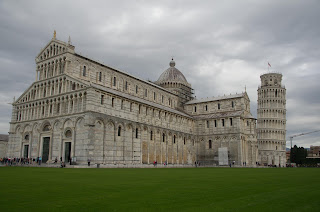

Everyone has heard of the Leaning Tower of Pisa. Well, it
does lean. Moreover, it is worth going to see. I’m not sure you need to see it
more than once, but our visit there was definitely worth the short drive from
Lucca. As Rick Steves constantly points out in his books, you must be careful
about parking driving in Italian cities of any size. Because the cities
tourists visit were built long before cars came on the scene, parking is at a
premium as is driving space. The narrow streets have led Italian cities and
towns to designate ZTL (Limited Traffic Zones) and a highly regulated parking
structure to assure the locals have places to park near their own homes. Heavy
fines greet violators, often by mail. This doesn’t mean that you can walk without
concern for vehicles because there are a lot of exceptions to the limitations
including delivery vehicles and taxis and even buses at times. The safest thing
is to drive around outside of the city walls when they are visible and watch
very carefully for the ZTL signs. In Pisa this turned out to be very easy and
we found a parking lot within one block of the Tower.


The nice thing about Pisa is that the main sights are all in
the same place which has come to be called the Field of Miracles. The tower,
the Duomo, and the Baptistery are all located in the same open area, most of
which is covered with grass. The two other buildings on the field, the hospital
(now a museum) and the Camposanto Cemetery are built with the same white marble
as the other three which gives the area a beautiful composition increasing the
sense of peace surrounding the area. The hawkers and restaurants and gift shops
are kept outside the Field creating a peaceful area for viewing the sights and
even relaxing on the grass as long as you don’t try to have a picnic.
 |
| The Baptistry |
The style of the exteriors is called Pisan Romanesque and it
avoids the heavy, fortress sense of most Romanesque architecture. The ground
floor uses widely-space half columns. The floors above have more closely-spaced
columns with walkways behind them. They are adorned above with different
geometric shapes along with a variety of sculptures and some mosaics. The use
of some contrasting marbles completes the pleasurable design giving these
buildings a gothic feel.
 |
| Adornment on the Tower |
 |
| Thousands of these pictures every day |
The tower is the main attraction and it does lean. As a
matter of fact it has leaned since building began in 1173. The ground is soft
and the builders did not provide enough foundational support before they began
building up. Construction stopped twice over the next two hundred years and
subsequent architects tried to correct the lean by building backwards. This
change in direction is obvious at the top level. Unfortunately, the leaning
continued to worsen leading to several efforts at remediation. A $30 million project
in the 1990s seems to have finally succeeded in halting the leaning. This
project actually corrected the lean by about six inches probably returning it
to the angle it was when Galileo conducted his gravity experiments 400 years
ago.
 |
| Donkey as gargoyle |
It costs €18 to enter and climb the tower, so we passed on
that pleasure. Looking over the rest of Pisa did not seem that interesting.
Instead, we had lunch before entering the Duomo. Building began in 1063 and it
was finished over the next 50 years. The 320-foot nave was the longest in
Christendom at the time reflecting Pisa's sea-trading power as a rival of Venice
and Genoa. The other highlights inside are the beautiful mosaics and stained
glass windows, the body of Pisa’s patron saint, St. Ranieri, whose face was
scanned with x-ray in 2000 for the creation of his new silver mask, the gaudy
pulpit by Giovanni Pisano with its lions representing Jesus killing the satanic
four horses of the Apocalypse, and the reproduction of the bronze incense
burner that caught the attention of a teenage Galileo. He timed the swings to
determine that the time did not change as the length of the swing shortened. He
used this concept as he measured the universe of the skies.
 |
| Galileo's incense burner |
 |
| Lion eating one of the horses |
We skipped the attendant museums and returned to our car for
the drive back to Lucca where we spent the night.
 |
| A new work of art on the Field of Miracles |























No comments:
Post a Comment